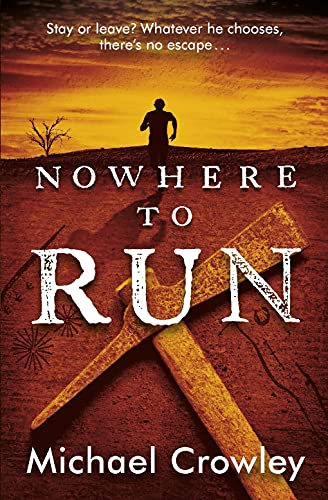Nowhere to Run: Stay or leave? Whatever he chooses, there’s no escape... (Diffusion Books) - Softcover

Zu dieser ISBN ist aktuell kein Angebot verfügbar.
Alle Exemplare der Ausgabe mit dieser ISBN anzeigen:Australia, 1788 - the first year of the penal settlement at Sydney Cove.
Nineteen year old convict and former Norfolk farm labourer Jacob Stone has been sentenced to seven years transportation for stealing a watch. He spent three years on a hulk and another at sea, leaving three to be worked in New South Wales.
Jacob is working at 'farm cove'; a pioneer farm for the settlement of eight hundred men and two hundred women. Rations are meagre, there is conflict with the 'natives', insects and rats invade the settlement come nightfall. The heat is unbearable, the soil infertile, nothing is growing. Some convicts are dying and some are fleeing into the bush never to be seen again. Two aboriginal men are captured by marines and held prisoner at the settlement in an effort to gain information about the country: what can be eaten, the location of fresh water supplies, game.
Fellow convict and former Cornish sailor William Broad has plans to steal an open boat and food from the stores and then escape up the coast. Jacob is enlisted into the gang by agreeing to steal some hatchets from farm cove.
In an act of pity, Jacob uses a stolen hatchet to cut the rope tying an aboriginal prisoner. However his theft is betrayed by a fellow worker in exchange for extra rations and he is sentenced to two hundred lashes. After a hundred lashes the surgeon calls a halt to the punishment. He will receive the remainder when he has recovered. Broad's escape takes place without Jacob and he cannot face another hundred lashes. He runs into the bush alone.
As far as he is able to Jacob heads north. Someone has told him that it is the way to China. He stays clear of the coast for fear of running into marines or a fishing party. Instead he finds a river that proves to be a tributary of a larger river. After three days of walking he is near starvation. The larger river he notices is thick with eels. He tries to spear them but cannot; he tries to capture them with his hands but drops them.
Jacob is approached by aboriginal people, in canoes with nets. They are armed. But amongst them is the man he helped escape from the convict settlement. He is taken to their camp, fed broiled eels, fruit and bread cakes.
He stays with the Barramatta people of Eel River for several weeks learning what the bush can provide. When it is time for them to move to another camp they tell him he must return to his own people. He knows he cannot survive alone in the bush and reluctantly heads back to camp.
On arrival he is summoned by the Governor. The Governor explains that he cannot escape the hundred lashes due or his leniency will be seen as weakness. Jacob explains that he has found a food supply and some land close to a river that is fertile. He can lead a party to it. This he does and the failed farm cove is abandoned for the fertile flood plain of Eel River
Jacob is spared his flogging and put in charge of the new farm that begins to feed the settlement. He is promised a farm of his own once his years of transportation are over.
Michael Crowley is a published playwright and poet who has worked extensively with people in custody. He has written short fiction as well as for the stage, BBC radio and short film. He teaches creative writing at Sheffield Hallam University and was writer in residence at HM YOI Lancaster Farms between 2007 and 2013. He previously worked in youth justice as a restorative justice coordinator. He is the author of Behind the Lines: creative writing with offenders and people at risk (Waterside Press, 2012) and in 2013 and short listed for a Butler Trust Award for services to criminal justice in regard to his writing work with prisoners.
Crowley has run reading groups for young prisoners with a range of reading ability and had undertaken training from the Shannon Trust. The purpose of his reading and writing work with offenders has always been about raising moral questions - a contribution towards rehabilitation.
Crowley has a detailed knowledge of the penal settlement in Australia having researched it for the last eighteen months. He is currently writing a collection of poetry, First Fleet, in the voices of convicts, marines and aboriginal people. At Lancaster Farms he worked with a group of prisoners for six weeks on Our Country's Good - the celebrated stage play about the penal settlement and he knows that this is a topic that prisoners find of great interest.
„Über diesen Titel“ kann sich auf eine andere Ausgabe dieses Titels beziehen.
- VerlagDiffusion
- Erscheinungsdatum2016
- ISBN 10 1908713054
- ISBN 13 9781908713056
- EinbandTapa blanda
- Anzahl der Seiten96
Neu kaufen
Mehr zu diesem Angebot erfahren
Versand:
EUR 11,76
Von Vereinigtes Königreich nach USA
Beste Suchergebnisse bei AbeBooks
Nowhere to Run Stay or leave? Whatever he chooses, there's no escape.
Buchbeschreibung Paperback. Zustand: Brand New. 96 pages. 7.80x5.08x0.50 inches. In Stock. Bestandsnummer des Verkäufers zk1908713054
Weitere Informationen zu diesem Verkäufer | Verkäufer kontaktieren
Nowhere to Run: Stay or leave? Whatever he chooses, there's no escape. (Diffusion Books)
Buchbeschreibung Zustand: New. Book is in NEW condition. 0.13. Bestandsnummer des Verkäufers 1908713054-2-1
Weitere Informationen zu diesem Verkäufer | Verkäufer kontaktieren

